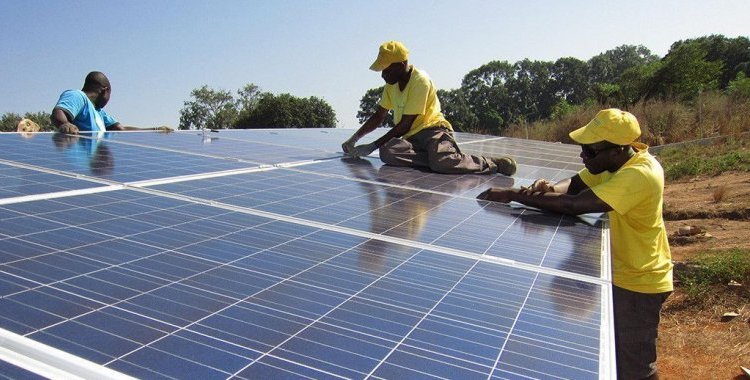Sustainability is, in fact, the set of practices that balance the relationship between the environment and its human communities, especially social, energy, economic and environmental issues. In this context, sustainability seeks to explore the development of natural resources to satisfy present needs without compromising the satisfaction of future needs.
Following this logic, another very important term is "Renewable Energy". Renewable energies are energies resulting from renewable resources, that is, they are theoretically inexhaustible, such as hydro, tidal, geothermal, solar, wind and biomass energy. In this sense, the contemporary analysis of its use is crucial as a factor of sustainable development for the province of Luanda. Furthermore, understanding the main advantages that contribute to the country's social and economic development is essential, especially with regard to the use of solar energy with the installation of solar panels. According to Sales (2010p.25), "energy generation, thermoelectricity causes environmental impacts that contribute to global warming through the greenhouse effect and acid rain". Therefore, the installation of solar panels would help to improve the quality of life of the native population and safeguard the environment.
However, it appears that in contemporary Angolan reality exactly the opposite occurs, since the use of this clean energy in the country is still very low, and the thermal energy used in case of machinery failure or failure to transport the energy produced in Laúca , Cambambe or Capanda, causes impacts on the environment due to the use of fossil fuels.
According to Fabiana Pacheco (2006, p.5-6) "Solar energy is energy from the sun. It can be used directly for space heating, water heating and electricity production, with the possibility of reducing consumption by 70% In addition, solar radiation can be used directly as a source of thermal energy, for heating fluids and environments, and for generating mechanical or electrical power. materials, among which the thermoelectric and photovoltaic stand out.
The use of natural lighting and heat for space heating, called passive solar heating, results from the penetration or absorption of solar radiation in buildings, thus reducing lighting and heating needs. Thus, a better use of solar radiation can be done with the help of more sophisticated architectural and construction techniques".
Thus, it is valid to propose the use of solar energy, which is captured through photovoltaic systems that produce electricity and, above all, preserves the environment. In addition, solar energy is extremely important for the diversification of the energy matrix in Luanda, in order to allow the distribution of energy in the lower areas of the city of Luanda, where they are generally the most penalized by the insufficiency of the electricity distribution infrastructure.
In this sense, increased access to energy is fundamental for the country's economic and social development, that is, as energy consumption increases, social conditions tend to improve due to its nocturnal activities, where industries, companies, hospitals and, above all, the population will be able to carry out certain jobs during the night shift. As a result, it also tends to improve the population's quality of life. Therefore, these beneficial energies are continually conquering the space that was previously occupied entirely by fossil sources. This fact has been provided by technological development that allows the use of renewable sources.
In light of this, it is worth asking: how will the use of renewable energy act as an essential factor for sustainable development in the province of Luanda? To achieve the sustainable development of renewable energy, Angola needs to invest significant amounts in the energy sector, diversify the energy matrix, strengthen civil, electrical, energy and mechanical engineering courses at the country's universities and beyond, implement consumption solar energy in the large cities of Luanda and especially in the most precarious areas of the capital, in order to reduce electricity consumption bills. However, it is clear that this is not an easy job, but with investment and qualified professionals, we would be taking very significant steps towards sustainable development.
In this way, the implementation of the use of renewable energies is fundamental in all sectors of the province of Luanda, whether in industries, schools, hospitals, training centers, in homes, on public roads, among others. In this logic, it can be seen that the debate on the use of solar energy as an essential factor for sustainable development in the province of Luanda is essential for the construction of a more just developed and environmentally sustainable society. From this perspective, instead of using alternative energy sources such as thermoelectric power and generators that harm the environment, it is imperative to install solar panels, a renewable energy source, in order to ensure the quality of life of the population and leverage the economic and social development of the country.
Thus, Luanda society will be able to move towards sustainable development without harming the present and future environment.
References
- FUCHINO, João Moisés. USO DE ENERGIAS RENOVÁVEIS COMO FACTOR ESSENCIAL DE DESENVOLVIMENTO SUSTENTÁVEL NA PROVÍNCIA DE LUNDA SUL. Revista Eletrônica Kulonga- TES.ISSN 2707-353X,V.2 n.2,p.24-34,2020.
- PACHECO, Fabiana. "Energias Renováveis: breves conceitos." Conjuntura e Planejamento 149(2006):4-11
- Lima, Raquel Araújo. "A produção de energias renováveis e o desenvolvimento sustentavél: uma análise no cenário da mudança do clima." Revista Direito E-nergia(2012) DUPONT, Fabrício Hoff;GRASSI,FERNANDO;ROMITTI, Leonardo.
- Energias Renováveis:buscando por uma matriz energética sustentável. Revista Eletrônica em Gestão, Educação e Tecnologica Ambiental Santa Maria,v.19, n.1, Ed.Especial, 2015,p.70-81. Revista do Centro de Ciências Naturais e Exatas-UFSM
Previous
Heriwalter Domingos The opinion of...








